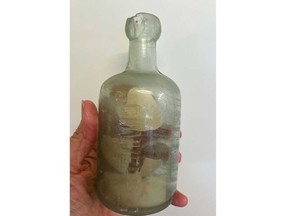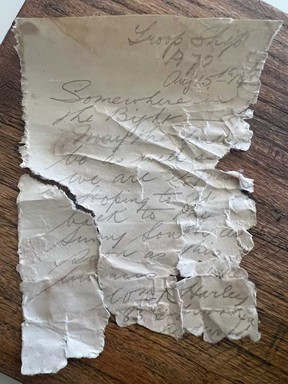
Contents of the article
MELBOURNE, Australia — Messages in a bottle written by two Australian soldiers days after their trip to the battlefields of France during World War I have been found more than a century later on the Australian coast.
Advertisement 2
Contents of the article
The Brown family found the Schweppes bottle just above the waterline at Wharton Beach near Esperance in Western Australia on October 9, Deb Brown said on Tuesday.
Contents of the article
Contents of the article
Her husband Peter and daughter Felicity made the discovery during one of the family's regular ATV expeditions to clean up trash from the beach.
“We clean up our beaches a lot and so we never pass by a piece of trash. So this little bottle was sitting there waiting to be picked up,” Deb Brown said.
Inside the clear thick glass were cheerful letters written in pencil by Privates Malcolm Neville, 27, and William Harley, 37, dated August 15, 1916.

Their warship, HMAT A70 Ballarat, left the South Australian state capital of Adelaide in the east on 12 August that year on a long journey to the other side of the world, where its men would reinforce the 48th Australian Infantry Battalion on Europe's Western Front.
Contents of the article
Advertisement 3
Contents of the article
A year later, Neville was killed in action. Harley was wounded twice but survived the war and died in Adelaide in 1934 from cancer, which his family said was caused by the Germans gassing him in the trenches.
A soldier's message to his mother and a bottle seeker
Neville asked the finder of the bottle to deliver a letter to his mother Robertina Neville in Wilkawatt, now a virtual ghost town in South Australia. Harley, whose mother died in 1916, was glad the finder kept his note.
Harley wrote: “May the finder be the same as we are now.”
Neville wrote to his mother that he was “having a very good time, the food has been very good so far, except for one dinner which we buried in the sea.”
The ship “rocked and rocked, but we're as happy as Larry,” Neville wrote, using now-faded Australian colloquialism for “very happy.”
Advertisement 4
Contents of the article
Neville wrote that he and his comrades were “somewhere at sea.” Harley wrote that they were “Somewhere in the bay”, referring to the Great Australian Bight. It is a huge open bay that starts east of Adelaide and extends to Esperance on the western edge.
Deb Brown suspects the bottle didn't travel far. He probably spent more than a hundred years on the shore, buried in the sand dunes. Extensive dune erosion caused by huge waves along Wharton Beach in recent months has likely displaced it.
Relatives are “stunned” by the discovery
The paper was wet, but the text remained legible. Thanks to this, Deb Brown was able to notify the relatives of both soldiers about the discovery.
The bottle “is in pristine condition. There are no shells on it. I believe that if it had been in the sea or out in the open for that long, the paper would have disintegrated in the sun. We wouldn't have been able to read it,” she said.
Advertisement 5
Contents of the article
Granddaughter Harley Ann Turner said her family were “absolutely stunned” by the discovery.
“We just can't believe it. It really is like a miracle and we really feel like our grandfather was reaching out to us from beyond the grave,” Turner told the Australian Broadcasting Corporation.
Neville's great-nephew Herbie Neville said his family had been brought together by the “incredible” discovery.
“He seemed very happy to go to war. It's very sad what happened. So sad that he lost his life,” Herbie Neville said.
“Wow, what a man he was,” the great-nephew added proudly.
Contents of the article







